Deploying AI voice assistants in your business can significantly enhance customer engagement and operational efficiency. Whether it's through customer service, task automation, or providing personalized assistance, AI voice assistants can be integrated across various platforms and devices, changing the way businesses interact with their customers and streamline their workflows. This guide will explore everything you need to know about how to deploy AI voice assistants to enhance your productivity, including the AI tools you’ll need.
What are AI Voice Assistants?
AI voice assistants, also known as conversational virtual assistants or digital assistants, are advanced software agents equipped to manage voice-based interactions with users. They are built using artificial intelligence technologies, including speech recognition, natural language processing (NLP), and machine learning, allowing them to comprehend and respond to spoken instructions or queries. AI voice agents are often employed in more specialized roles such as customer service, where they can autonomously handle support calls, make recommendations, and resolve issues without human intervention. Their ability to provide consistent, scalable, and 24/7 customer interactions makes them valuable assets in industries like retail, telecommunications, and healthcare.
How AI Voice Assistants Work
AI voice assistants function like virtual receptionists, streamlining interactions in a highly efficient and automated manner using sophisticated artificial intelligence technology. When a call is made or received, these agents engage with the caller using natural language processing (NLP) to understand and interpret queries or requests in real time.
They can answer questions, schedule appointments, provide information about services, and route calls to appropriate departments or individuals based on conversation context. Equipped with machine learning algorithms, AI voice assistants continuously learn from each interaction, enhancing their response accuracy and ability to handle a broader range of queries. This capability allows them to manage high call volumes efficiently, reduce wait times, and free up human staff for more complex tasks, ensuring consistent and professional front-line interactions like an always-available, tireless virtual receptionist.
What Makes Conversational AI Different Than Chatbots and Siri?
As artificial intelligence continues to evolve, the distinctions between different types of AI technologies have become more pronounced. Conversational AI stands out as a particularly advanced form of technology so let’s dive into its differences with traditional chatbots and the generalist approach of voice assistants.
Conversational AI Voice Assistants
Conversational AI differs from traditional chatbots and voice assistants like Alexa or Siri primarily in its depth of interaction and contextual understanding as well as generative AI abilities to handle entire conversations autonomously. Conversational AI uses advanced natural language processing (NLP) and machine learning technologies to engage in more natural, human-like dialogues with users. It can understand nuances, maintain context over the course of a conversation, and even recognize and adapt to different user emotions or intents. This allows conversational AI to provide more personalized and sophisticated responses, making it ideal for complex customer service tasks, personalized shopping experiences, and in-depth problem-solving scenarios.
Chatbots
Traditional AI chatbots, like OpenAI’s ChatGPT which works on a large language model, often operate based on pre-defined scripts and simple decision trees, making them suitable for handling straightforward and repetitive tasks. They lack the advanced understanding and adaptive learning capabilities of conversational AI, which can lead to less satisfactory interactions when user queries deviate from standard scenarios. They are also often text-based.
Voice Assistants
Voice assistant technology like Amazon's Alexa, Amazon Echo, Google Assistant, Microsoft’s Cortana, and Apple's Siri or AI-powered and voice-activated smart home devices such as smart speakers or Google Home are capable of understanding, voice recognition, and executing a variety of voice commands, are still primarily designed for general consumer use, handling a wide range of simple tasks like setting reminders, playing music, or providing weather updates. These AI personal assistants do not specialize in deep conversational contexts and often reset context with each new query, unlike conversational AI, which can maintain and build upon the context throughout an interaction.
Use Cases of Conversational AI Voice Assistants Across Different Industries
Conversational AI voice assistants are reshaping how businesses engage with their customers and streamline their operations. By automating routine interactions and enhancing customer service capabilities, conversational AI voice assistants are not just improving efficiency but are also transforming user experiences in various sectors. Here is just a small look into the use cases of conversational AI voice assistants:
AI Voice Assistants for Healthcare
Conversational AI voice assistants can assist in managing patient data, setting appointments, and offering continuous patient support. AI voice assistants can also provide reminders for medication, schedule follow-up visits, and even offer basic diagnostic support, thus reducing the administrative burden on healthcare providers and improving patient care.
AI Voice Assistants for Retail
Conversational AI voice assistants can enhance the shopping experience by acting as personal shopping assistants. These AI voice agents can recommend products based on customer preferences, manage inventory inquiries, and process orders. They can also handle customer service inquiries in real time, offering solutions, tracking order statuses, and managing returns, which significantly enhances customer satisfaction and loyalty.
AI Voice Assistants for Finance
Conversational AI agents are transforming customer service and support. Banks and financial institutions can employ AI voice assistants to handle transactions, check account balances, assist in bill payments, and provide detailed financial advice securely. These virtual assistants are available 24/7, providing real time responses to customer queries.
AI Voice Assistants for Hospitality
The hospitality industry benefits from conversational AI by enhancing guest experiences from booking to checkout. AI voice assistants in hotels can manage reservations, provide information about local attractions, and facilitate in-room services, all through voice commands. They can also handle complex tasks like adjusting room settings or managing feedback, which allows staff to focus on providing more personalized guest services.
AI Voice Assistants for Real Estate
Real estate agencies can use conversational AI voice assistants to streamline property searches and client communications. These assistants can qualify potential leads by answering property-related queries, scheduling viewings, and even providing virtual tours. By automating these initial interactions, realtors can allocate more time to closing deals and providing personalized services to serious buyers, enhancing efficiency and client satisfaction.
AI Voice Assistants for Restaurants
Conversational AI voice assistants can handle reservations, respond to customer inquiries about menu items or ingredients, and even assist in order management. During peak hours, AI voice assistants can manage multiple customer requests simultaneously, reducing wait times and improving the customer experience. They also provide valuable support to the staff by automating routine tasks, such as taking orders or managing feedback, which allows the staff to focus on providing high-quality service.
AI Voice Assistants for Customer Support
Conversational AI voice assistants have become a cornerstone in the realm of customer support, transforming how businesses interact with their customers across various sectors. These AI agents can autonomously handle a wide array of customer queries, from troubleshooting product issues to providing billing information, thus significantly reducing the need for human agents. By offering 24/7 support, these assistants ensure that customer needs are addressed promptly, regardless of the time of day, which enhances customer satisfaction and loyalty.
How Conversational AI Voice Assistants Can Transform Your Business
Integrating conversational AI voice assistants into your business can lead to transformative benefits across multiple operational areas. These advanced AI tools, powered by machine learning and natural language processing, enable naturalistic interactions with customers, significantly enhancing user experience and satisfaction.
By automating routine inquiries and support tasks, AI voice assistants can drastically reduce the workload on human employees, allowing them to focus on more complex and value-adding activities. This not only improves operational efficiency but also helps in scaling customer service operations without proportionally increasing the staff count. Ultimately, the adoption of conversational AI can lead to increased customer retention, higher conversion rates, and a stronger competitive edge in the marketplace.
AI Voice Assistants: Two Options
When deploying AI voice assistants, businesses typically have two main options to choose from: using AI voice agent template platforms or developing a custom solution through AI text to speech voice APIs. Template platforms provide a quick and straightforward means to implement AI voice technology with minimal coding, ideal for businesses looking for fast deployment. On the other hand, AI voice APIs offer flexibility and customization, catering to organizations requiring tailored solutions that align closely with their unique business processes.
AI Voice Agent Template Platforms
AI voice agent template platforms are designed to simplify the deployment of AI voice assistants, making advanced technology accessible to businesses without requiring deep technical expertise. These platforms come with a range of pre-built templates that cater to various industries and use cases, from customer service to internal task management. Users can choose a template that closely matches their needs and then customize it to align with their specific requirements.
AI Voice API: Build Your Own
For companies that require highly specialized solutions, building a custom AI voice assistant using AI voice APIs can be the ideal choice. This option provides complete control over the functionalities, user experience, and integration aspects of the AI system. Developers can use these APIs to craft bespoke solutions that seamlessly integrate with existing business systems, workflows, and data infrastructure, ensuring that the AI voice assistant operates optimally within the organizational context.
Build Your Own Custom AI Voice Assistant
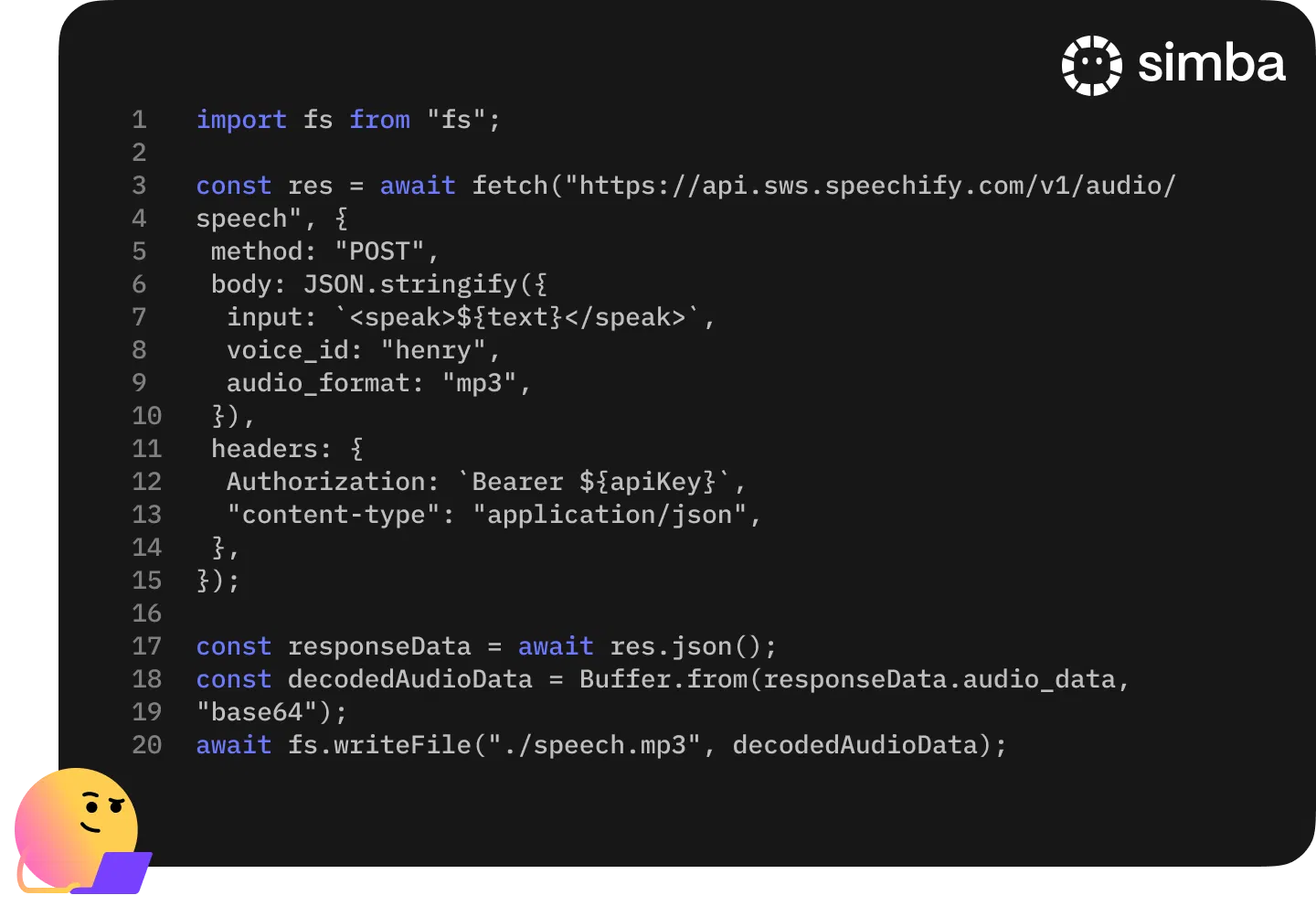
When developing custom AI voice assistants to boost your customer interactions, it's essential to select a top-notch text to speech (TTS) and voice API for a high-quality, natural voice output. The Speechify Text to Speech API is an excellent choice for these implementations, offering distinct advantages for customer engagement:
- High-Quality, Natural-Sounding Voices: Speechify Text to Speech API boasts over 200 AI voices that are clear, expressive, and lifelike, making them ideal for delivering a superior auditory experience in customer interactions.
- Custom Voice Cloning: Businesses can use Speechify Text to Speech API to develop unique or cloned voices, crafting a distinctive voice identity that strengthens brand presence and personalized customer service.
- Emotional Range for Enhanced Engagement: Speechify Text to Speech API features a variety of emotional tones, including energetic, warm, calm, and direct. These options enable the AI to connect more effectively with users, enhancing the overall communication experience in customer service environments.
- Extensive Customization Options: Speechify Text to Speech API user interface allows significant customization of voices. Developers can adjust tone, pitch, and pace to fine-tune the assistant's speech, aligning it closely with specific customer engagement strategies.
- Comprehensive Language Support: With support for over 50 languages and dialects, including regional accents like Castilian Spanish and Mexican Spanish, Speechify Text to Speech API is equipped to handle international customer service requirements, making it suitable for global operations.
- Low Latency for Real-Time Interaction: Speechify Text to Speech API’s low latency ensures that voice responses are delivered promptly, which is crucial for real-time applications such as virtual customer assistants and interactive voice response systems.
Top Five AI Voice Assistants
If you’re seeking pre-made AI voice assistants, let’s explore the top platforms:
JustCall
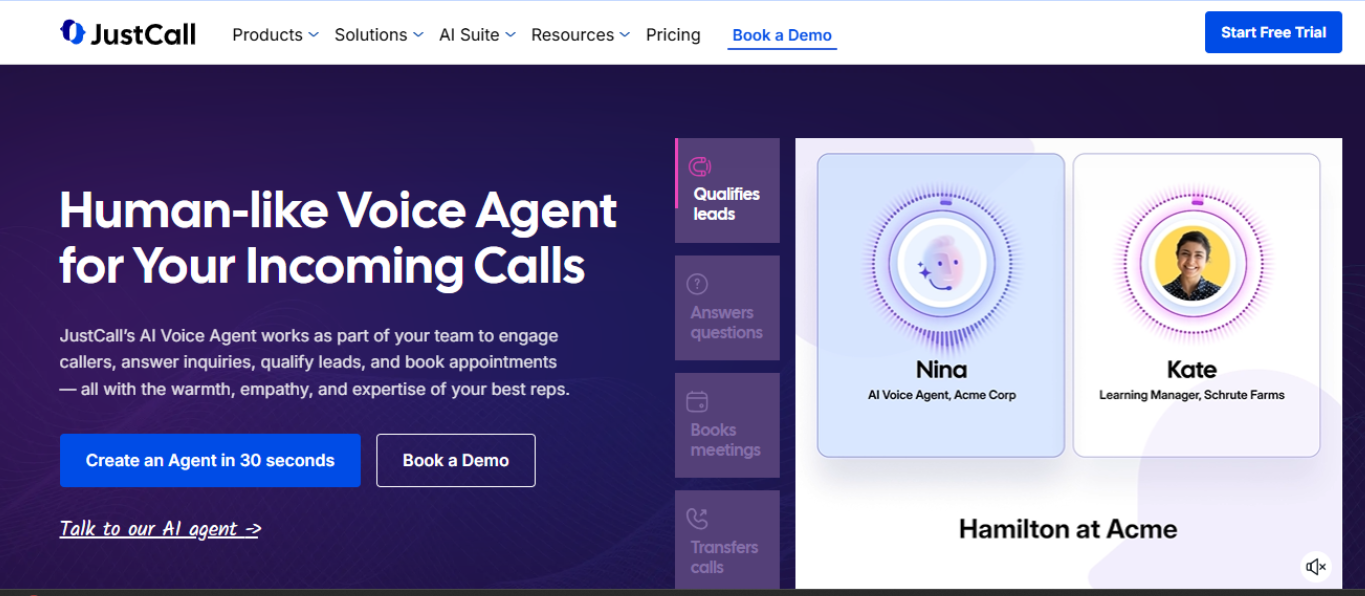
JustCall is a cloud-based AI phone system engineered for sales and support teams. It includes an auto-dialer, interactive voice response (IVR), and call routing, and integrates seamlessly with a wide array of CRM systems to optimize telephony operations. This system allows teams to conduct and receive calls via their CRM, providing detailed analytics that help refine call strategies. Additional features like SMS campaigns, scheduling appointments, and tracking performance make JustCall an all-inclusive communication solution for enterprises.
Bland AI

Bland AI leverages advanced AI voice assistants to streamline telephone-based customer service across different industries. These assistants facilitate smooth, natural dialogues akin to those with a human receptionist, adept at managing queries, scheduling, and collecting user feedback. This innovation not only expands the scalability of customer service but also standardizes communication quality, becoming an indispensable tool for companies looking to elevate their customer interaction frameworks.
Calldesk
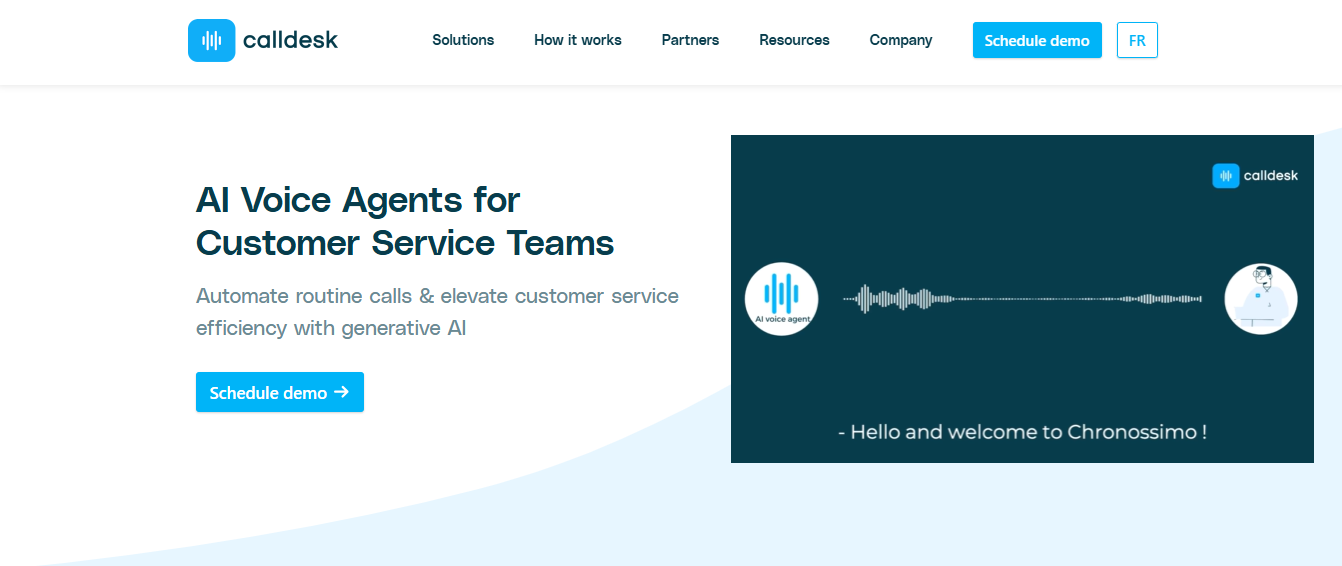
Calldesk introduces AI voice assistants designed to independently manage large volumes of customer calls. These assistants excel at performing tasks such as scheduling appointments, addressing customer inquiries, and resolving issues, all while integrating smoothly with existing call center software to ensure a seamless service experience. Its sophisticated natural language understanding enables it to manage complex interactions, alleviating the load on human agents and boosting operational efficiency.
Synthflow AI
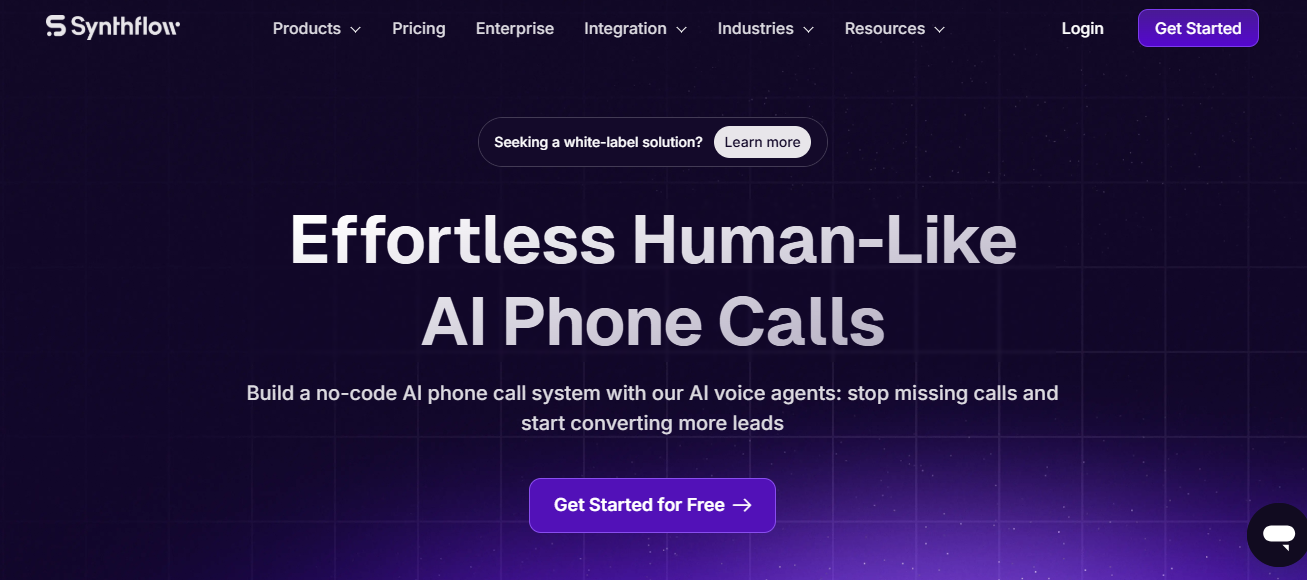
Synthflow AI provides a no-code platform that simplifies the creation and deployment of AI voice assistants, eliminating the need for coding expertise. Its intuitive interface facilitates easy AI integration into customer interactions, boosting both engagement and operational efficiency. With features like real-time voice interactions, text to speech, and extensive customization options for communication solutions, Synthflow AI is ideal for businesses looking to automate tasks ranging from lead qualification to customer support. Designed for scalability, it ensures reliable management of numerous calls, automating routine tasks such as booking appointments and collecting feedback.
Air.ai
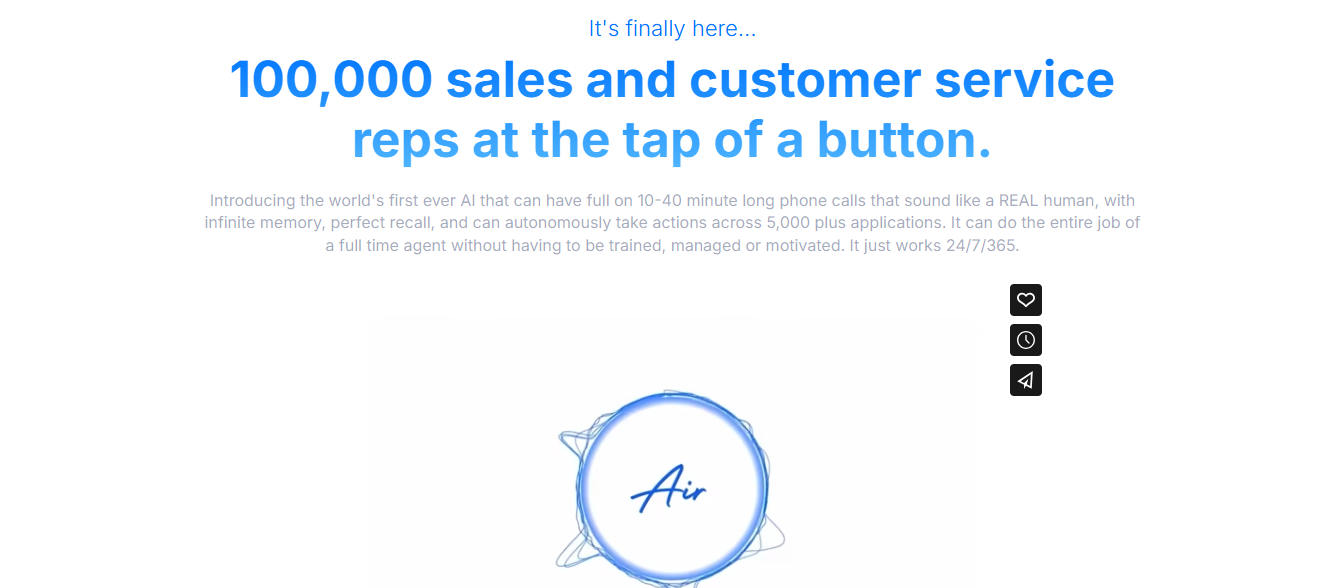
Air.ai is a sophisticated conversational AI platform crafted to support natural, human-like phone conversations, particularly suited for sales and customer service tasks. This AI voice assistant platform excels in managing prolonged discussions lasting from 10 to 40 minutes without requiring human involvement, significantly enhancing efficiency in customer interaction management across diverse industries. It is equipped to integrate with more than 5,000 applications, enabling it to autonomously handle a vast array of tasks. Additionally, Air.ai offers a remarkable suite of features including infinite memory, flawless recall, and round-the-clock availability.
Conclusion
In conclusion, choosing the right AI voice assistant solution depends heavily on the specific needs and resources of a business. For those prioritizing speed and ease of use, template platforms are a pragmatic choice. However, businesses aiming for a more custom integration and personalized experience that adheres tightly to their operational requirements will find greater value in utilizing AI voice APIs. Among the options available, the Speechify Text to Speech API stands out as a particularly robust tool for creating custom AI voice assistants. It offers extensive customization capabilities, allowing businesses to craft unique voice solutions that enhance user interactions and streamline communication processes.
FAQ
Does Speechify have an app?
Yes, Speechify offers mobile apps so you can listen to any text read aloud on iOS devices, iPads, iPhones, or Androids.
What is the voice AI everyone is using?
Speechify Text to Speech API allows companies and individuals to create realistic AI voices.
How does Siri help with multitasking?
Siri aids in multitasking by allowing users to send text messages, interact with social media, and perform various tasks hands-free, enhancing productivity and convenience.
What is the best AI voice assistant?
Speechify Text to Speech API allows users to create custom AI voice assistants with ease.

